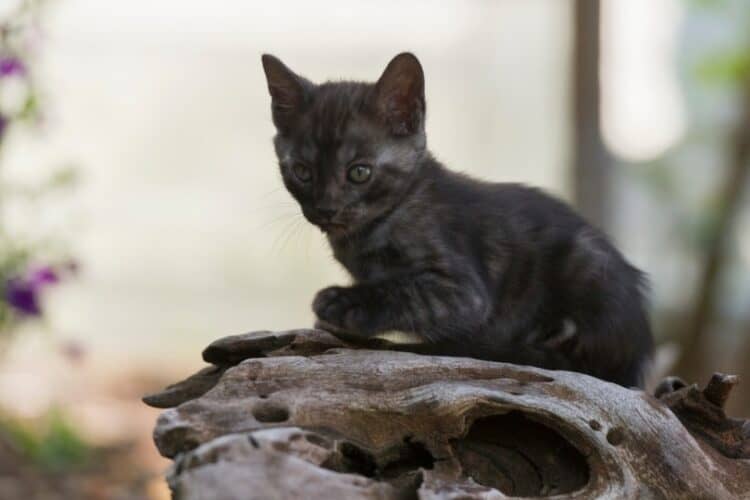If you’ve ever wanted to own a panther, the black Bengal cat gives you that option. With black spots on a black background, it isn’t noticeable at first glance that their fur isn’t completely black. This beautiful cat is rare and can cost more than other color variations.
Bengals are curious, playful felines with wild spirits that can be hard to manage, and first-time cat owners often might struggle to tame them. Like their Asian Leopard cat ancestors, the black Bengal cat loves water and enjoys nothing more than playing in the bath with their favorite human.
The Earliest Records of Black Bengal Cat in History
The Bengal cat’s origin is attributed to a California-based breeder, Jean Mill. In 1963, she crossed a Domestic Shorthair with a wild cat species, the Asian Leopard. This makes the Bengal cat a relatively new breed.
Asian Leopard cats are wild felines from Asia that are the size of a domestic cat, and many of the Bengal cat’s traits can be attributed back to them. Bengals love water, and they have energetic natures and distinctive spots.
Until the 1970s, Bengal cats were called Safari Cats when their name was changed to reflect the Asian Leopard cat’s scientific name, “Prionailurus bengalensis.”
How Black Bengal Cat Gained Popularity
It is estimated that less than 10 percent of all Bengal cats are black, which makes them particularly rare. When something is rare, people are willing to pay more for it, and black Bengals can go from $2,000 to $4,000.
Over the years, Bengal cats have been coveted because of their resemblance to wildcats. It’s rumored that a woman in London paid $50,000 for her Bengal cat, which earned it the “Rolls Royce of cats” nickname.
Breeding a black Bengal cat is tricky because the coloring relies on recessive genes. That means kittens must inherit two copies of the gene, one from each parent. Finding a breeder who breeds black Bengal cats is difficult because black is not an official color, so many stay away from it. Those who do may have waiting lists because there is such a high demand for their kittens.
Formal Recognition of Black Bengal Cat
In 1986, Bengals were accepted as an official breed by The International Cat Association (TICA.) However, charcoal is the closest TICA-accepted color, which can be spotted or marbled. Black or melanistic Bengals are an unofficial shade.
Top 4 Unique Facts About Black Bengal Cat
- Bengal Cats Bark – Bengal cats don’t meow like your typical cat; they make a much raspier sound that sounds more like a bark.
- They Aren’t Dainty – Bengal cats are muscular and athletically built. Generally, they can weigh 8–15 pounds.
- Mini-Panther – A black Bengal cat is more like a panther in other ways besides its color. They are skilled and avid hunters and enjoy eating fish, so keep your pet goldfish out of harm’s way!
- They Are Super Smart – Bengal cats are incredibly smart and love to learn new tricks. They can even be trained to walk alongside their owners on a leash. However, Bengals don’t have the same strength in their necks as a dog, and it’s safest to use a harness. You can get a harness or walking jacket made specifically for your cat’s unique build.
Does Black Bengal Cat Make a Good Pet?
Bengal cats are packed full of personality. They are active, confident, curious, and athletic, and they aren’t for the faint-hearted pet parent. They need to be both mentally and physically stimulated. They are very social cats and enjoy the company of their families. They also get on well with children and dogs that are cat-friendly.
They thrive on consistent interaction, and if you are going to be out of the house consistently, invest in toys and games. Consider bringing a second kitty into your home since Bengal cats love having a companion to play with. If you fail to give your Bengal enough attention or an outlet for all their energy, they will find (and destroy) your belongings for entertainment.
Wrapping Up
Black Bengal cats are like miniature panthers in more ways than one. They aren’t your typical lap cat who will want to curl up on the sofa daily. They enjoy hunting, playing, and getting wet! They’re an adventurer at heart and might be tricky for a first-time cat parent to handle. However, as long as you’re willing to spend time with them and engage with their needs, you will be fine because what your Bengal loves most is spending time with its favorite humans!
Featured Image Credit: Heidi Bollich, Shutterstock














